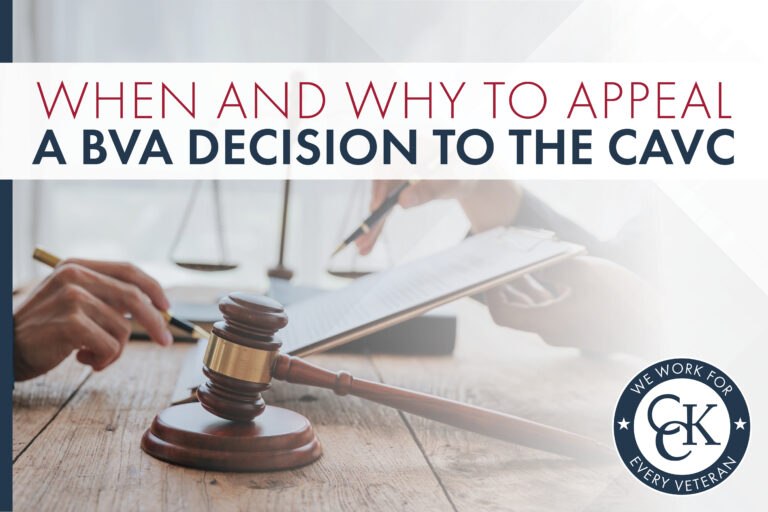When and Why to Appeal a BVA Decision to the CAVC

CCK Law: Our Vital Role in Veterans Law
If you are a veteran who received an unfavorable decision from the Board of Veterans’ Appeals (BVA), appealing to the U.S. Court of Appeals for Veterans Claims (CAVC) might be your next crucial step. However, understanding when and why this appeal makes sense is essential.

Timing Is Critical
You have exactly 120 days from the date the BVA decision was mailed to file a Notice of Appeal with the CAVC. Missing this deadline means losing your opportunity to take your case to court, though you could still pursue other VA claim options like filing a supplemental claim.
CAVC Appeals Allowed Only After Final Decisions
The CAVC will only consider cases where the BVA has made a final decision. If your case still has options besides the CAVC, or if VA is still considering your claim in some way—such as being remanded for further evidence or reconsideration—you will need to wait before appealing to the court.
Top Reasons to Appeal to the CAVC
- Legal Errors by the Board
If the BVA misapplied laws or regulations, such as neglecting to consider theories of entitlement clearly indicated in your record (e.g., service in Southwest Asia without considering the PACT Act), appealing could rectify these errors. - Ignored or Overlooked Evidence
The Board may have disregarded favorable medical records or other supportive evidence. Veterans are entitled to the “benefit of the doubt” as mandated by 38 U.S.C. § 5107(b). Failing to apply this correctly is grounds for appeal. - Failure in VA’s Duty to Assist
The VA is obligated to assist in gathering necessary, relevant evidence for your claim. If they failed to obtain critical medical records or did not provide necessary medical examinations, appealing to the CAVC may be your recourse. - Procedural Mistakes by the VA
Procedural errors like improper notification or mishandling of evidence constitute due process issues that the CAVC can address.
Three Important Differences Between CAVC Appeals and VA Claims and Appeals
- VA is Adversarial: VA claims and administrative appeals (i.e., appeals before the Board) are considered non-adversarial. In other words, VA has a duty to assist veterans and give significant deference to veteran evidence. But court appeals at the CAVC are adversarial—VA attorneys will defend the agency’s decision.
- No New Evidence: The CAVC review is also strictly limited to the record existing at the time of the Board’s decision. No new evidence is considered.
- Lawyers Are Even More Crucial: While not mandatory, hiring an experienced veterans law attorney significantly enhances your appeal’s chances. The arguments presented must be clear, legally robust, and backed by established precedent—skills that veterans themselves typically do not have. Professional representation helps ensure the strongest possible case.
Possible Outcomes of a CAVC Appeal
The CAVC rarely grants benefits outright. Typically, the court will either:
- Remand your case back to the BVA to address specific errors and reconsider your claim, or
- Affirm the BVA decision, finding no error.

Conclusion
Appealing a Board decision to the CAVC is not suitable for every veteran, but if the BVA has made significant legal, procedural, or evidentiary mistakes, appealing can provide the neutral oversight needed to correct these issues. With skilled legal representation, a CAVC appeal offers a critical opportunity to challenge VA’s decision and potentially achieve the benefits you rightfully deserve.
Need Assistance with a CAVC Appeal?
Chisholm Chisholm & Kilpatrick is the leading VA-accredited veterans law firm in the U.S., having represented nearly 30,000 veterans or dependents at the Department of Veterans Affairs and the U.S. Court of Appeals for Veterans Claims. Many of the most precedent-setting cases in veterans law were argued by CCK Law attorneys. Contact CCK Law online or call (800) 544-9144 for a free case evaluation today.
About the Author
Share this Post
